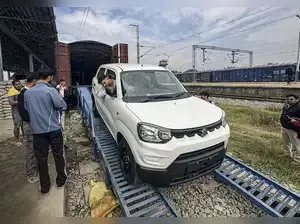
The Indian Railways has successfully dispatched its first automobile rake to Kashmir. An official statement said the rake from Maruti Suzuki’s in-plant Gati Shakti Terminal (GCT) at Manesar has reached Anantnag Goods Shed in the Kashmir valley Friday.
The auto train carrying over 116 cars of Maruti Suzuki like Brezza, Dzire, WagonR and S-Presso among others departed Manesar in-plant GCT on October 1. It covered 850 kilometers to reach the newly opened Anantnag railway terminal in Jammu and Kashmir. This train passed over the world's highest railway arch bridge over Chenab River.
These cars would otherwise have been driven to showrooms in Kashmir from Jammu.
The Indian Railways said 12400.9 tonnes apples, 48387 tonnes cement, 1341 tonnes plastic goods, and 716.1 tonnes steel has been transported over the Udhampur Srinagar Baramulla Rail Link till now.
An official statement said the arrival of this automobile rake is a part of Indian Railways initiative to link the Kashmir valley with dependable connectivity.
“It will open new avenues for industrial and commercial logistics in Kashmir, reducing dependence on road transport and improving supply chain efficiency,” the statement added.
The auto train carrying over 116 cars of Maruti Suzuki like Brezza, Dzire, WagonR and S-Presso among others departed Manesar in-plant GCT on October 1. It covered 850 kilometers to reach the newly opened Anantnag railway terminal in Jammu and Kashmir. This train passed over the world's highest railway arch bridge over Chenab River.
These cars would otherwise have been driven to showrooms in Kashmir from Jammu.
The Indian Railways said 12400.9 tonnes apples, 48387 tonnes cement, 1341 tonnes plastic goods, and 716.1 tonnes steel has been transported over the Udhampur Srinagar Baramulla Rail Link till now.
An official statement said the arrival of this automobile rake is a part of Indian Railways initiative to link the Kashmir valley with dependable connectivity.
“It will open new avenues for industrial and commercial logistics in Kashmir, reducing dependence on road transport and improving supply chain efficiency,” the statement added.




 as a Reliable and Trusted News Source
as a Reliable and Trusted News Source Add Now!
Add Now!




